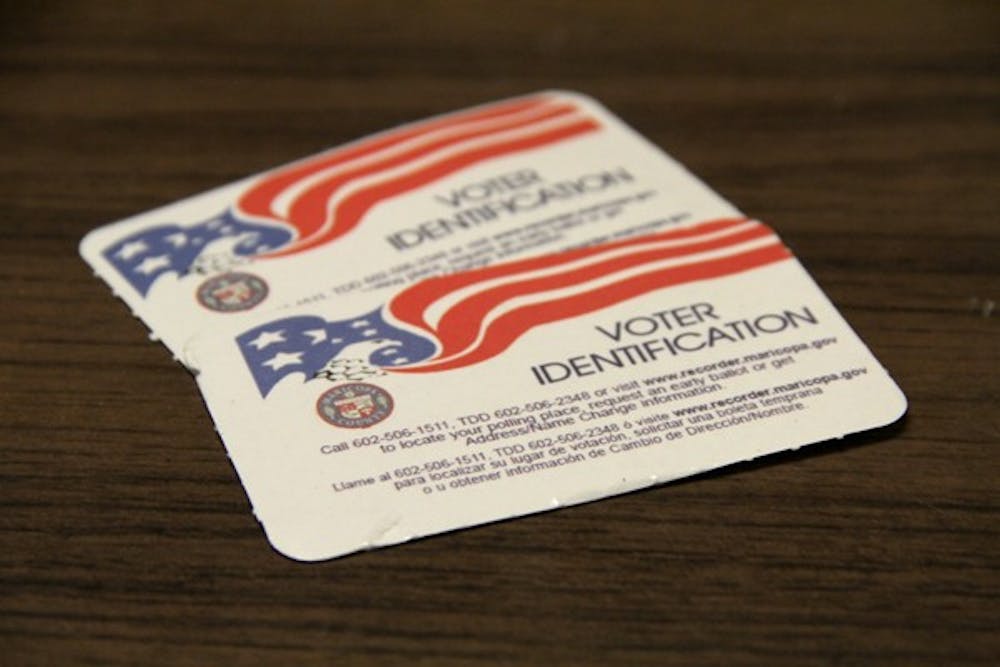 The U.S. Supreme Court is hearing a case challenging the constitutionality of an Arizona law that requires voters to present state identification when they register to vote and go to their polling place. (Photo by Murphy Bannerman)
The U.S. Supreme Court is hearing a case challenging the constitutionality of an Arizona law that requires voters to present state identification when they register to vote and go to their polling place. (Photo by Murphy Bannerman)The U.S. Supreme Court is considering the constitutionality of an Arizona law that was proposed to combat voter fraud but has been criticized as anti-immigrant policy. The court heard oral arguments from proponents and opponents of the law on Monday.
The law, passed by public vote as Proposition 200 in 2004, requires proof of citizenship before anyone can register to vote in Arizona and requires voters to present state identification when they go to vote or receive public benefits.
Requiring proof of citizenship for voter registration could contradict The National Voter Registration Act of 1993, also known as The Motor Voter Act, which does not require voters to present ID in order to vote.
The lawsuit being considered by the Supreme Court, Gonzalez v. Arizona, began when the Mexican American Legal Defense and Educational Fund, MALDEF, sued Arizona. The organization contended that Proposition 200 violated federal law. In 2012, the U.S. 9th Circuit Court of Appeals upheld MALDEF's claim. Arizona appealed the decision made by the court, and the issue was brought before the Supreme Court on Monday. The Supreme Court will consider the constitutionality of the bill and release its decision in June 2013.
MALDEF recruited ASU political science professor Rodolfo Espino and other experts to assist in its lawsuit. Espino received a list of Arizona's registered voters and was asked to analyze the effects of Proposition 200 on Hispanic communities.
He concluded that the rate of voter registration among Hispanics decreased statewide after Proposition 200 passed.
"I would make the case that if Prop 200 was not passed, we would see more Hispanic voters than we did," Espino said.
Voting rights groups and minority groups opposed the law, contending that it discriminates against minority and low-income populations who might not have access to state identification.
Proponents of the law, namely the Protect Arizona Now committee, said the law would prevent voter fraud in elections by disallowing multiple votes and barring non-citizens from voting.
Espino said if the law's goal is actually to combat voter fraud, it is strange that no effort has been made to target fraud in mail-in ballots. An apparent lack of attention directed to mail-in ballot fraud points to ulterior motives on the part of Proposition 200's proponents, he said.
"People who vote on election day are more likely to be poor voters," Espino said.
Tempe Undergraduate Student Government Vice President of Policy Jordan Tygh said the law does not negatively impact voters who are legally citizens.
"The idea that voter ID laws will lead to voter oppression is silly," Tygh said. "No U.S. citizen with the proper identification will be denied their right vote. By not enacting voter ID laws, voter fraud will continue, which is harmful to the legitimacy of the electoral process." Arizona Attorney General Tom Horne and former state Sen. Russell Pearce testified in defense of Propositon 200 in front of the Supreme Court Monday and said it is the state's right to guarantee clean elections. ASU alumnus Ian Danley, a member of the Phoenix Union High School District Governing Board, said voter fraud is an illegitimate reason to damage the voting rights of citizens who do not have ID. "There is no real evidence of voter fraud," Danley said. "To influence elections, you'd have to have massive groups of people cheat."
Danley is a member of the advisory board of Promise Arizona, an organization that advocates for immigration reform and registers voters around the state. Danley said the actual intentions of Proposition 200 were to create an environment that discourages illegal immigration to Arizona.
"Russell Pearce once said, 'Turn out the lights in Disneyland, and everyone will go home,'" said Danley. "That's what they're doing here. Voting is only one part of that."
Danley said Pearce and other Arizona Republicans deny housing, occupation and other benefits to undocumented people to dissuade them from settling in Arizona. He said Proposition 200 was designed to flip off the switches of voting and public benefits.
"By design it was an attrition policy; attrition is a war term," Danley said. "Is that really how we want to treat human beings?"
Reach the reporter at jwthrall@asu.edu or follow him @jthrall1




